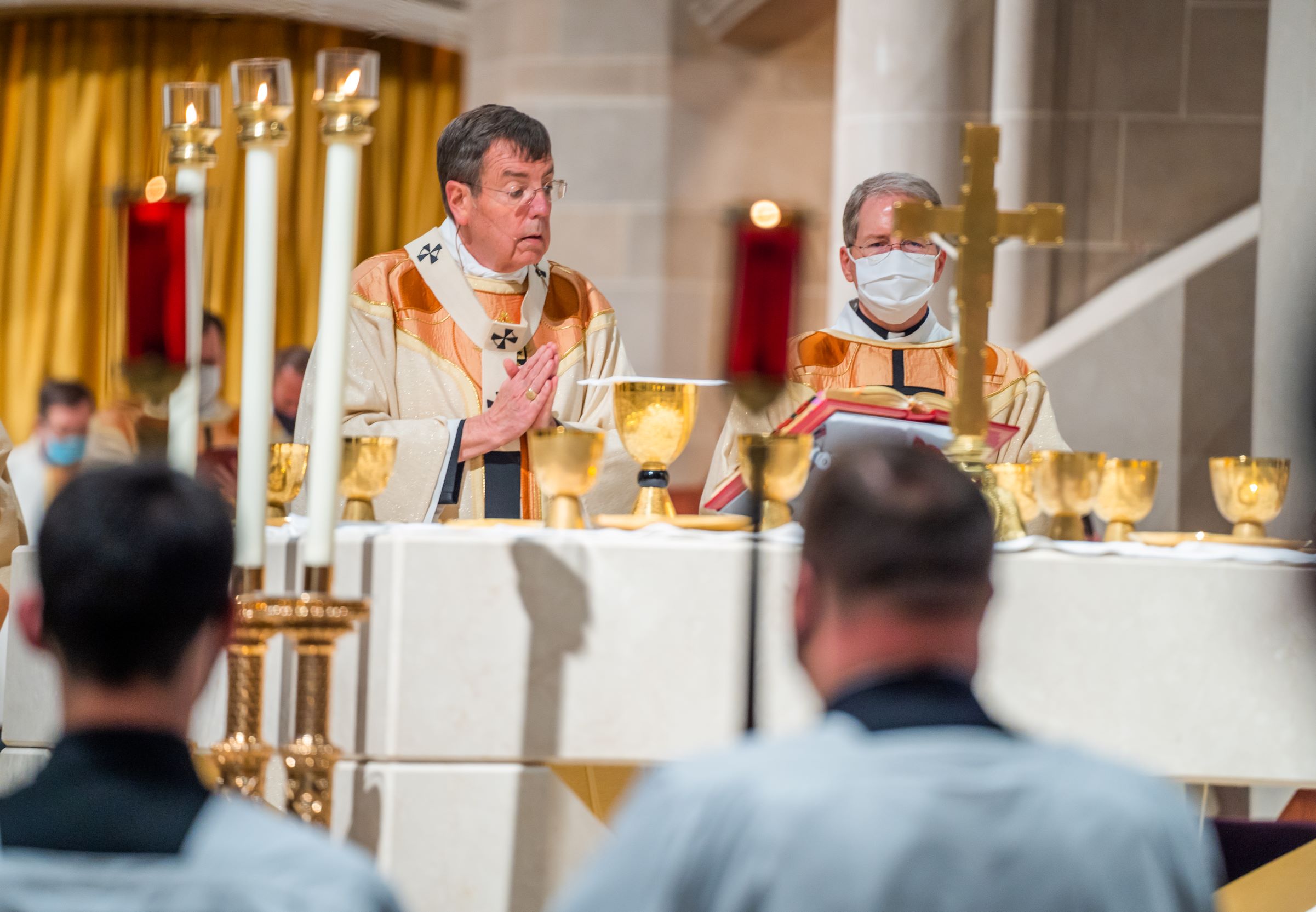After last year’s Mass was limited to a ‘skeleton crew of 10,’ chief shepherd expresses appreciation for the Archdiocese of Detroit’s clergy
DETROIT — The last line of Archbishop Allen H. Vigneron’s homily during the 2021 Chrism Mass at the Cathedral of the Most Blessed Sacrament might have been the most impactful.
After reflecting on the significance of the sacred oils and Chrism to be blessed during the Holy Thursday liturgy, April 1, the archbishop paused for a moment before departing the ambo.
“I’m really glad you’re all here today,” he said, addressing the nearly 500 priests and deacons in attendance. “Thank you.”
The simple gesture — a formality in most years — was met with thunderous applause. Just a year ago, during the first days of the coronavirus pandemic, it wasn’t possible at all.
“What a contrast that is with last year, when Fr. (Jim) Grau reminded me that we were only a skeleton crew of 10,” Archbishop Vigneron said with a smile. “It’s good to have the extra help today.”

Besides an occasion for the archbishop to bless the oils to be used in the sacraments of baptism, confirmation and holy orders during the coming year, the annual Chrism Mass is a chance for the archdiocese’s clergy to gather together and renew their own priestly vows.
Traditionally celebrated on Holy Thursday in the Archdiocese of Detroit, last year’s Mass was celebrated on a Monday — in an empty cathedral, livestreamed to the faithful and clergy scattered across the archdiocese.
While COVID-19 is still a presence in southeast Michigan — and with case numbers beginning to rise again — a year into the pandemic, the local Church has proven effective at keeping the virus at bay through social distancing and safety protocols.
Even inside the spacious cathedral — which seats nearly 1,000 — priests were spaced six feet apart and wearing masks.
This year’s Chrism Mass felt like a homecoming of sorts, with priests again gathering to renew their promises and collect the sacred oils to bring back to their parishes.

“Part of my joy in having all of you here in the cathedral today is that we make visibly present the prayer of the Church by which the oils and the Chrism are sanctified,” Archbishop Vigneron said in his homily.
The archbishop acknowledged the pain of the past year — much of it borne by the archdiocese’s clergy — during a time when the archdiocese is undergoing historic changes, such as the transition to families of parishes.
“I give God thanks for all of you. Sincerely, I do,” the archbishop said. “For the sacrifices you make, I can’t tell you how impressed I am. When I ask you to do something, and you say, ‘Bishop, if that’s what the Church needs, that’s what I’ll do,’ — this is what’s most edifying to me. It’s one of the reasons I don’t run away. I want to be as good as you are.”
Archbishop Vigneron said he understands the gravity of the sacrifices he asks the archdiocese’s priests to make — especially when those sacrifices are difficult.
“I understand what I ask. Especially in these years when we are changing so significantly in the priestly ministry, I do know what it costs,” Archbishop Vigneron said. “But by my best light, fathers, this is an offering that will help us be better priests, be better witnesses to the Lord Jesus, and better serve the priestly people, so that they can be more closely configured to Christ and serve the kingdom.”

The sacred oils are a tool to help priests and deacons do that, the archbishop added. Through the anointing of the Holy Spirit — made possible by Christ’s sacrifice — the faithful are sent to proclaim the Gospel to all who will hear it, he said.
“By the anointing and consecration, the Christian people are made priests, all of us, in order that we can take our piece of the world — my home, my work, my job, wherever I am — to make that an offering to the Father, part of the new creation, which is given by the Father and given back to the Father in Christ Jesus.”
Priests and deacons, in turn, equip the faithful to be able to make such an offering, he said.
“Our leadership, our pastoring, our teaching, is all about preparing and sustaining the people of God in order for them to be able to make the self-offering of them, their families, their life, their work, along with the body and blood of Christ,” Archbishop Vigneron said.
When a priest is ordained, he’s called to “imitate what we handle,” the archbishop said. While the most obvious reference is to the holy Eucharist — Jesus himself — “don’t we in some way handle, so to speak, the lives of the Christian faithful?” he asked.
“And what we try to help them do and be, we too must imitate that. We must ourselves be what we teach. We must ourselves be priests of our own lives, offered along with Christ’s body and blood and offered along with his members in the Holy Eucharist,” he said.
“Everything in the life of the Church is about the Eucharist, leading to it, coming from it, so that at the end, when God is all in all, there will be no more struggle. There will just be thanksgiving, as we will truly be that kingdom of priests for God our Father.”










